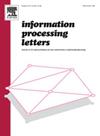Fair and truthful allocations under leveled valuations
IF 0.6
4区 计算机科学
Q4 COMPUTER SCIENCE, INFORMATION SYSTEMS
引用次数: 0
Abstract
We study the problem of fairly allocating indivisible goods among agents which are equipped with leveled valuation functions. Such preferences, that have been studied before in economics and fair division literature, capture a simple and intuitive economic behavior; larger bundles are always preferred to smaller ones. We provide a fine-grained analysis for various subclasses of leveled valuations focusing on two extensively studied notions of fairness, (approximate) MMS and EFX. In particular, we present a general positive result, showing the existence of 2/3-MMS allocations under valuations that are both leveled and submodular. We also show how some of our ideas can be used beyond the class of leveled valuations; for the case of two submodular (not necessarily leveled) agents we show that there always exists a 2/3-MMS allocation, complementing a recent impossibility result. Then, we switch to the case of subadditive and fractionally subadditive leveled agents, where we are able to show tight (lower and upper) bounds of 1/2 on the approximation factor of MMS. Moreover, we show the existence of exact EFX allocations under general leveled valuations via a simple protocol that in addition satisfies several natural economic properties. Finally, we take a mechanism design approach and we propose protocols that are both truthful and approximately fair under leveled valuations.
在均衡估值下公平、真实地分配
研究了具有水平估价函数的智能体之间不可分割商品的公平分配问题。之前在经济学和公平分配文献中研究过的这种偏好,捕捉到了一种简单而直观的经济行为;大捆总是比小捆更受欢迎。我们对分层估值的各种子类进行了细粒度分析,重点关注两个广泛研究的公平概念,(近似)MMS和EFX。特别地,我们提出了一个一般的积极结果,表明在估值下存在2/3-MMS分配,这些分配都是水平的和次模的。我们还展示了我们的一些想法如何在水平估值的类别之外使用;对于两个子模块(不一定是水平的)代理,我们证明总是存在2/3-MMS分配,补充了最近的不可能结果。然后,我们切换到次加性和分数次加性水平代理的情况下,我们能够在MMS的近似因子上显示1/2的紧密(下界和上界)界限。此外,我们还通过一个简单的协议证明了在一般水平估值下EFX分配的存在性,该协议还满足几个自然经济性质。最后,我们采用了一种机制设计方法,并提出了在均衡估值下既真实又近似公平的协议。
本文章由计算机程序翻译,如有差异,请以英文原文为准。
求助全文
约1分钟内获得全文
求助全文
来源期刊

Information Processing Letters
工程技术-计算机:信息系统
CiteScore
1.80
自引率
0.00%
发文量
70
审稿时长
7.3 months
期刊介绍:
Information Processing Letters invites submission of original research articles that focus on fundamental aspects of information processing and computing. This naturally includes work in the broadly understood field of theoretical computer science; although papers in all areas of scientific inquiry will be given consideration, provided that they describe research contributions credibly motivated by applications to computing and involve rigorous methodology. High quality experimental papers that address topics of sufficiently broad interest may also be considered.
Since its inception in 1971, Information Processing Letters has served as a forum for timely dissemination of short, concise and focused research contributions. Continuing with this tradition, and to expedite the reviewing process, manuscripts are generally limited in length to nine pages when they appear in print.
 求助内容:
求助内容: 应助结果提醒方式:
应助结果提醒方式:


